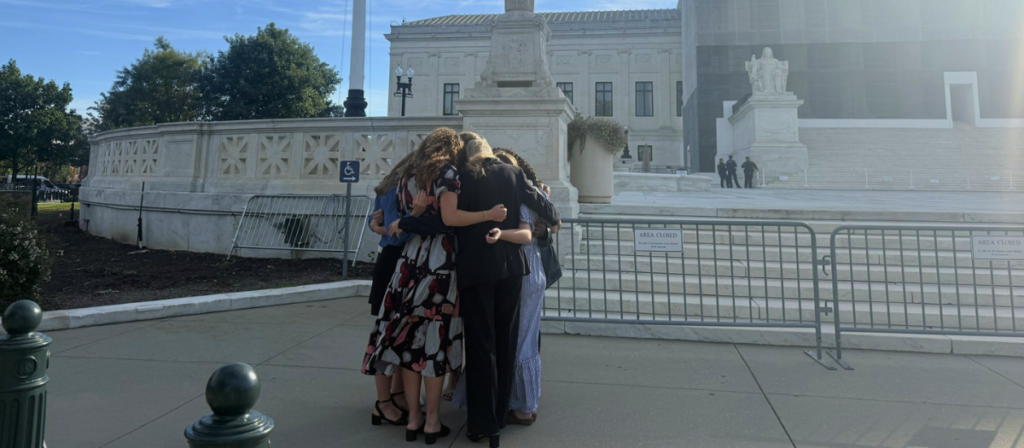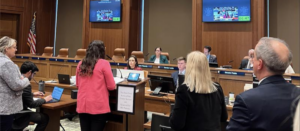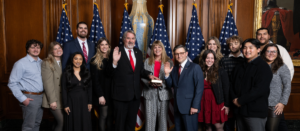Even though up to 90 percent of children who struggle with gender dysphoria at an early age will eventually work out their issues through puberty so that they align their identity to their sex, Colorado wants to prohibit licensed counselors from helping children to do just that. The state wants to force counselors to just be affirming when a person says their identity is different than their sex. Even if the person says they want help in changing those emotions to align with their sex, the state wants to prohibit the doctor’s help in that direction.
To that end, they instituted a law forbidding counselors from rendering such help, infringing on the constitutional rights of counselors like Kaley Chiles, who courageously set out to challenge the law, at much personal and professional cost, all the way to the U.S. Supreme Court.
Thankfully, October 7 was a good day for Chiles at oral arguments. As Concerned Women for America (CWA) leaders prayed outside the court, inside, James Campbell of the Alliance Defending Freedom delivered arguments in favor of Freedom of Speech and against government censorship to a strong reception from the Court.
“Colorado forbids counselors like Kaley Chiles from helping minors pursue state-disfavored goals on issues of gender and sexuality,” he said to start his appeal. “Colorado insists that its law is subject only to rational basis review, yet that would allow states to silence all kinds of speech in the counseling room, such as disfavored views on divorce or abortion. If heightened scrutiny doesn’t apply, states can transform counselors into mouthpieces for the government.”
He is exactly right. The law engages in blatant viewpoint discrimination that the Court has historically rejected. Most recently, in National Institute of Family and Life Advocates (NIFLA) v. Becerra, the Court slapped down the state’s attempt to manipulate the communications between licensed professionals and their clients.
As Campbell explained:
[O]ne of the things that’s so problematic about Colorado’s law is that it undermines the well-being of kids that are struggling with gender dysphoria …. Colorado accepts that up to 90 percent of kids who struggle with that before puberty will work their way through it and realign their identity with their sex. But this law says that if any of those children go to a licensed professional and say: I would like help realigning my identity with my sex, that licensed professional has to decline to help them.
Most Justices appeared skeptical.
Justice Samuel Alito said, correctly, that the state appeared to be wanting to relitigate the NIFLA case, but was still concerned beyond that:
I don’t really see a difference between the argument that you’re making now and the argument that I thought we rejected in NIFLA, that professional speech is a special category that’s outside normal First Amendment scrutiny, but I’ll –let me put that aside and ask about your interpretation of the statute at this stage in the litigation.
And let me give you this example: Suppose an adolescent male comes to a licensed therapist and says he attracted –he’s attracted to other males but feels uneasy and guilty about those feelings, and he wants to end or lessen them and asks for the therapist’s help in doing so.
Under your interpretation of the statute, is that banned?
Colorado Solicitor General Shannon Stevenson struggled to avoid answering directly but was finally forced to admit, it would: “If the therapist told him or he asked, ‘Can you help me become straight? ‘ the answer would be, it would be banned.”
Under the microscope of the Supreme Court, many of Colorado’s arguments collapsed. They argued that Chiles did not even have standing to sue them because the statute would not really apply to her. But under pressure, even liberal Justice Sonia Sotomayor had to admit the standing question was settled. Here is the revealing exchange that started with some poignant questions by Justice Neil Gorsuch:
JUSTICE GORSUCH: Well, both the district court, which ruled for you, found standing, and the Tenth Circuit, which ruled for you, found standing.
And you didn’t cross-appeal on those. And –not that you had to, it’s standing. You didn’t even put a Roman numeral in your brief on it or even a subsection. It’s –it’s footnote 18 on page 23.
That doesn’t exactly suggest that you have great confidence in that argument, does it?
STEVENSON: Well –well, we recognize we lost it twice. And again, it is the Petitioner’s burden. And it has been a persistent issue in the case, I think, in defining exactly what it is she wants to do.
And to come back to this conduct point -
JUSTICE GORSUCH: But if she’s –if she does, consistent with a patient’s –if I am reading the verified complaint, if I understand that to mean, paragraphs 86, 87, that she wishes to help clients who voluntarily come and –with the desire to change their behaviors, expressions, attractions, and identity, then that, that would give her standing, wouldn’t it?
STEVENSON: Identity, yes.
JUSTICE GORSUCH: Only identity.
STEVENSON: But the others not.
JUSTICE GORSUCH: The others not because of your peculiar reading of the statute. But identity would, that would give her standing?
STEVENSON: I –the change in sexual orientation or identity is the key to
JUSTICE GORSUCH: And that would give her standing?
STEVENSON: That would.
JUSTICE GORSUCH: Okay.
JUSTICE SOTOMAYOR: Because you’re not disavowing that.
STEVENSON: No.
JUSTICE SOTOMAYOR: Okay. So that settles the standing question.
The solicitor general was trying, but the arguments were particularly weak because the evidence in the case was weak. Colorado acted like they were standing with “the science,” but as we have seen in so many instances in recent times, governments often manipulate science to serve their own agendas.
Here is Campbell pointing out that the state did not put a single report or study addressing the particular situation in the case because it doesn’t exist:
The expert materials admit that they don’t have any study addressing precisely what’s at issue –or specifically focusing on precisely what’s at issue here, which is voluntary conversations between a licensed professional and a minor.
Their –their expert materials also recognize that they cannot prove harm ….
[T]heir own expert materials recognize that many people have experienced life-changing benefits from this kind of counseling.
Again, the APA’s own report talks about how this helps people because they’re able to align their life with their religion. They’re able to find deeper relationships with God.
Experienced appellate advocate Hashim Moopan argued against Colorado’s law on behalf of the U.S. Government, raising considerable concerns in this area by pointing out that “medical consensus” has been used in grievous ways throughout the years. “[I]n the 1970s, it was the standard of care, professional consensus, that being gay was a mental illness. So, on [CO’s] position, a state in the 1970s could have made it illegal for a therapist in the state to counsel a gay patient that they weren’t mentally ill.”
Moopan also explained why the Court should decide the case completely, instead of sending it back for more proceedings at the lower courts: “One is there is ongoing irreparable harm to the Petitioner because of the restriction of their speech. And the second is the evidentiary record here is totally clear that they can’t satisfy strict scrutiny.”
Overall, it was a great day at the Court for Free Speech. Let us continue to pray for the Justices as they continue to consider that case and make a final judgment.






